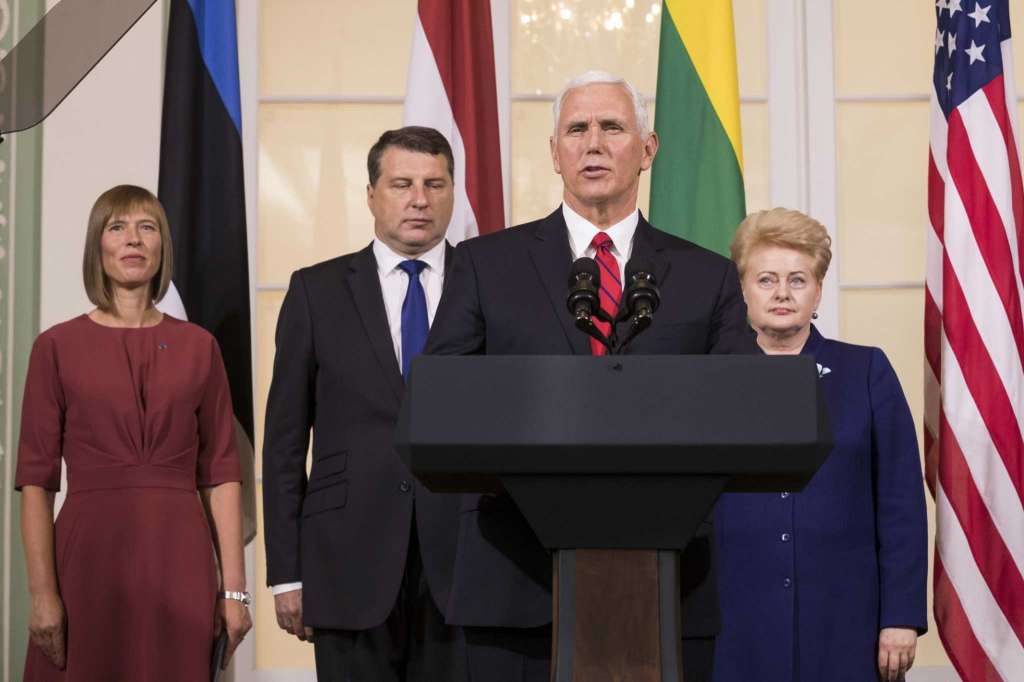U.S. Vice President Mike Pence has reaffirmed Washington’s support for the Baltic nations and accused neighboring Russia of seeking to “redraw international borders ” and “undermine democracies.”
“We stand with the people and nations of Estonia, Latvia, and Lithuania, and we always will,” Pence said on July 31 in the Estonian capital, Tallinn, where he met with the three Baltic presidents — Kersti Kaljulaid, Raimonds Vejonis, and Dalia Grybauskaite.

Estonia, Latvia, and Lithuania are members of NATO and were under Moscow’s rule during the Soviet era.
The three countries and other allies in Eastern Europe that have expressed concerns about Russia’s intentions in their respective regions.
“No threat looms larger in the Baltic states than the specter of aggression from your unpredictable neighbor to the east,” Pence said. “At this very moment, Russia continues to seek to redraw international borders by force, undermine the democracies of sovereign nations, and divide the free nations of Europe against one another.”
The United States “rejects any attempt to use force, threats, intimidation, or malign influence in the Baltic states or against any of our treaty allies,” he also said.
Pence said the U.S. administration “stands firmly” behind Article 5 of the NATO treaty — the provision stating that an attack on one NATO country is an attack on all members of the alliance.
He also pledged that the United States would not be deterred from its goals by Moscow’s demand for drastic cuts in staff levels at U.S. diplomatic facilities in Russia.
“Recent diplomatic action taken by Moscow will not deter commitment of the United States to our security, the security of our allies, and the security of freedom-loving nations around the world,” he said.
After Pence began his visit to Estonia on July 30, Prime Minister Juri Ratas said the U.S. vice president raised the possibility of deploying the Patriot antimissile defense system in the country.
“We spoke about it today, but we didn’t talk about a date or time,” Ratas told state broadcaster ERR.
The U.S. Patriot defense system is a mobile, ground-based system designed to intercept missiles and warplanes.
Ratas also said the two leaders talked about the upcoming Russian military maneuvers planned for near the Estonian border, “and how Estonia, the United States, and NATO should monitor them and exchange information.”
From Tallinn, Pence was due to travel to Georgia on July 31 and later to the newest NATO member, Montenegro.
In Georgia, which has expressed hopes of joining the Western alliance, officials said Pence will highlight U.S. support for the Caucasus nation’s sovereignty and territorial integrity.
Georgia has seen Russian encroachment on its territory. The Kremlin recognized Georgia’s breakaway regions of Abkhazia and South Ossetia as independent countries after fighting a five-day war against Tbilisi in 2008. Russia maintains thousands of troops in the two regions.
Georgian President Giorgi Margvelashvili said on July 27 that Pence’s visit will demonstrate that the United States continues to support Georgia in building a stronger military force.
During Pence’s visit, 800 Georgian and 1,600 U.S. troops are taking part in the previously planned Noble Partner 2017 exercises.
Troops from the United States, Britain, Germany, Turkey, Ukraine, Slovenia, and Armenia were taking part.
“The vice president’s presence here is definitely showing that this is not only about military exercises, but it is also showing unification with our values, with our foreign policy targets, and showing a clear message that we are together,” Margvelashvili said.
The White House said Pence would arrive in Tbilisi in the evening on July 31 and participate in an official dinner hosted by Georgian Prime Minister Giorgi Kvrikashvili.
On the last stop, Pence will welcome NATO’s newest member with his stop in Montenegro, whose accession to the alliance in June was adamantly opposed by Russia.
On August 2, he will attend the Adriatic Charter Summit in Montenegro’s capital, Podgorica, U.S. officials said.
Pence was expected to highlight the U.S. commitment to the Western Balkans and stress the need for good governance, political reforms, and rule of law in the region.
The leaders of Albania, Bosnia-Herzegovina, Croatia, Kosovo, Macedonia, Serbia, and Slovenia are also scheduled to attend the summit.
